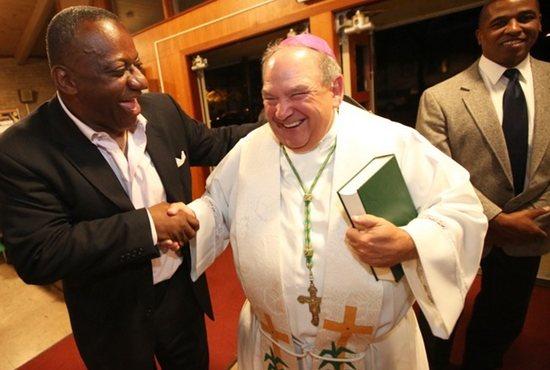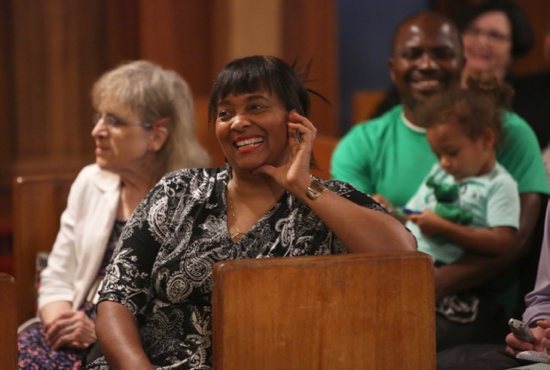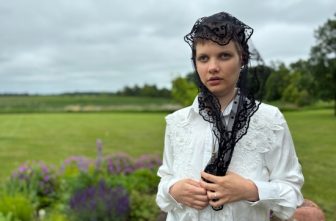
Updated Sept. 15
A crowd of people filled St. Peter Claver in St. Paul to pray for peace Sept. 8 in light of the racial tensions and violence this past summer.
Archbishop Bernard Hebda led the people in the ecumenical prayer service on the vigil of the National Day of Prayer for Peace in Our Communities. The U.S. Conference of Catholic Bishops called for the day of prayer on Sept. 9, the feast of St. Peter Claver, in response to police shootings involving black men locally and nationally during the summer.
“We got together this evening as a people of faith to begin a discussion,” Archbishop Hebda said in his homily. “I was reminded right before I came in, it’s a first step.”
He spoke of everyone’s need for one another as members of the mystical body of Christ, referencing the hymn sang for the responsorial psalm. The archbishop went on to elaborate how that need calls each person to respond to the other’s suffering.
“How important it is that we strive as best we can to begin to address some of that pain, that we begin to address some of the hurts that we weren’t even responsible for,” Archbishop Hebda said.
Living only blocks from St. Peter Claver and the Rondo neighborhood, Archbishop Hebda recalled his own experience of the impact of Philando Castile’s death on July 6. Police officer Jeronimo Yanez shot Castile during a traffic stop in Falcon Heights. Black Lives Matter held a protest only days late on Interstate 94 near St. Peter Claver.
“Certainly, I know as you do that tension that we felt,” Archbishop Hebda said. “I heard in those days, most especially after the death of Mr. Castile, those sirens that seemed to be without end certainly on Summit Avenue.”
Awareness of racism and violence reached the U.S. bishops’ ears at large and prompted the formation of a committee led by Archbishop Wilton Gregory of Atlanta to guide the bishops in addressing these issue. An African American himself, Archbishop Gregory once visited St. Peter Claver as Archbishop Hebda mentioned in his homily.
Pope Francis also has an awareness of U.S.’s history of racial tensions, which Archbishop Hebda said to the congregation. The pontiff referenced Dr. Martin Luther King multiple times during his 2014 visit to Philadelphia and Washington, D.C.
Archbishop Hebda said Pope Francis, “certainly understood how important it is that we address as a community any of that hatred that’s in our hearts, any of that prejudice that’s in our hearts.”
With the volume of racial tension and violence in America at this time, no one institution can tackle the problem as the archbishop expressed. He called the congregation to take a step forward in facing this challenge.
“How important it is that we work together, we put our heads together, we put our hearts together, we put our hands together in prayer to begin to address this challenge,” Archbishop Hebda said.
Archbishop Hebda used the parish’s patron, St. Peter Claver, as an example for the congregation to follow in upholding the dignity of each person. The saint served as a Jesuit priest and cared for slaves from Africa on the ships that arrived in Cartagena, Spain.
“I suspect for all of those who were brought in bondage to Cartagena, who came to know that perfect Jesuit priest, that he made a difference in their lives,” Archbishop Hebda said.
The parish of St. Peter Claver began in the 1800s with the blessing of Archbishop John Ireland. From the beginning, St. Peter Claver served African American Catholics in St. Paul, which continues. Archbishop Hebda described St. Peter Claver as a place of inter-racial dialogue in addition to being a place where one can meet Christ.
“I’m so grateful as well for the wonderful way in which you have been able to model for our archdiocese, how it is that we can really engage one another in spite of differences of race or of culture,” Archbishop Hedda said, addressing St. Peter Claver parishioners in particular.
Joining Archbishop Hebda, Bishop Andrew Cozzens and St. Peter Claver pastor Father Erich Rutten helped lead the prayer service. The Rev. Charles Gill, the pastor of Pilgrim Baptist Church in St. Paul, also gave a message at the service; he exhorted the people to follow Archbishop Hebda’s call to dialogue and action to address racism and xenophobia in the culture. It starts with individual responsibility and turning to Christ.
“We ask that the Lord would show us with his loving mercy, the presence of sin in our lives, especially in that area of injustice or racism, prejudice,” Archbishop Hebda said. “If the Lord would lovingly show that to us so that we would at least know to ask for pardon. We also come before the Lord in prayer to ask for his wisdom.”





